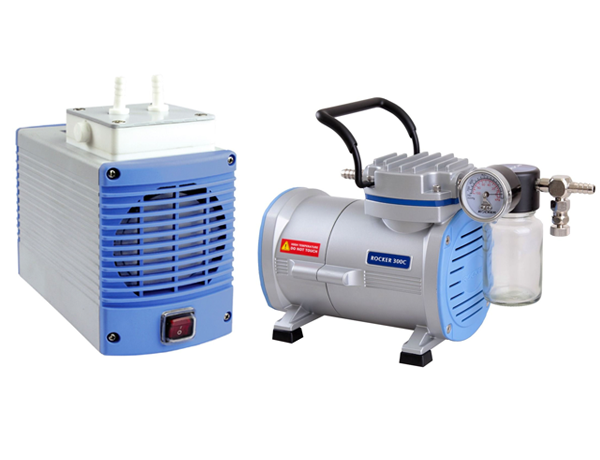Comparing Chemically Resistant Vacuum Pumps: Chemker 300 vs. Rocker 300C

Choosing a new vacuum pump for your lab requires balancing important considerations including cost/longevity, performance/versatility, and power/size, but it can be simple. This article compares two of Sterlitech’s leading chemically resistant pumps: the Chemker 300 and the Rocker 300C. Both pumps are manufactured by Rocker Scientific Co. and used for widespread applications in filtration technology.
Chemical resistance and PTFE
A solvent resistant vacuum pump is a critical piece of equipment for labs working with organic extractions, including cannabis extraction, natural products for pharmaceuticals, food safety. Both the Chemker 300 and the Rocker 300C are designed with chemically resistant polytetrafluoroethylene (PTFE) materials, which do not react with corrosive gases, with the exception of highly acidic/alkaline substances. Renowned for its non-stick properties, PTFE is a fluorinated polymer and has high chemical resistance to both aqueous and organic solvents because of the strength of the C-F bonding network [1, 2].
Product Comparison
|
Specs |
 |
||
|
Cost: |
$688.04 |
||
|
Max Vacuum: |
105 mbar |
||
|
Max Flow (110V/220V): |
20/18 L/min |
||
|
Motor Rotation (110V/220V): |
1700/1450 rpm |
||
|
Horse Power: |
⅛ HP |
||
|
Noise Level: |
50 dB |
||
|
Net Weight: |
5.0 kg |
||
|
Dimensions (cm): |
20.3 L x 11.2 W x 20.9 H |
||
|
Features
|
|||
|
Specs |
 |
||
|
Cost: |
$370.80 |
||
|
Max Vacuum: |
145 mbar |
||
|
Max Flow (110V/220V): |
23/20 L/min |
||
|
Motor Rotation (110V/220V): |
1750/1450 rpm |
||
|
Horse Power: |
⅛ HP |
||
|
Noise Level: |
50 dB |
||
|
Net Weight: |
4.1 kg |
||
|
Dimensions (cm): |
28.3 L x 13.5 W x 20.4 H |
||
|
Features
|
|||
Product comparison summary
Comparatively, both pumps are similar in terms of performance specifications, chemical resistance, and scientific applications. Considering all its internal wetted parts are coated with PTFE, versus only the diaphragm of the Rocker 300C, the Chemker 300 may corrode less over time leading to greater longevity and lower repair costs. However, the Chemker 300 offers a stronger vacuum than the Rocker 300C and both models offer an equivalent flow rate.
So how does a lab decide which pump is right for them? If you’re looking for a durable pump designed to endure continuous use and exposure to chemicals, the Chemker 300 is most appropriate. The Rocker 300C is ideal for applications with slightly corroded chemicals or customers with a budget limit. Both the Rocker 300C and Chemker 300 pumps don’t have a significant difference in terms of their space and time-saving features. Both products provide a safe, reliable, and chemically resistant vacuum for a wide range filtration and extraction applications.
References
- Chemical resistance PTFE. Polyfluor. Retrieved from https://www.polyfluor.nl/en/chemical-resistance/ptfe/#:~:text=PTFE-,Chemical%20resistance%20PTFE,are%20physical%20and%20also%20reversible
- Breaking harmful bonds. Phys Org. (2008). Retrieved from https://phys.org/news/2008-08-bonds.html
- Most Viewed Blog Articles (5)
- Company News (285)
- Emerging Technologies (64)
- Microbiology and Life Science News (93)
- Water and Fluid Separation News (97)
- Filtration Resources (93)
- Product News (19)


![Join Sterlitech at BIO 2024 [Booth #5558]: Exploring the Future of Biotechnology](https://www.sterlitech.com/media/blog/cache/300x200/magefan_blog/b4.jpeg)



